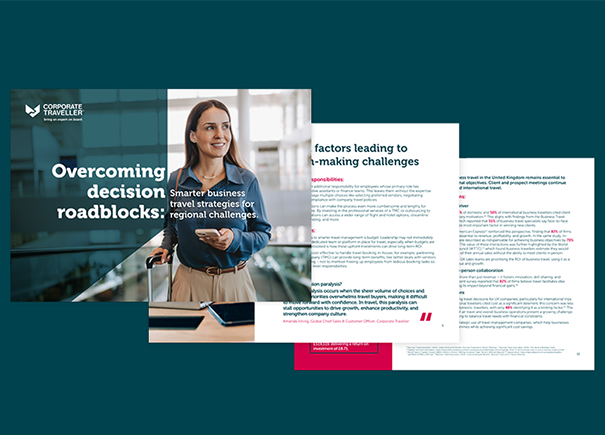
Overbooked and overspent: Top mistakes made by businesses when booking travel in-house
With corporate budgets being squeezed by the rising cost of loans and operational expenses, new research has revealed that more than half (55 per cent) of businesses are also losing out on savings when they book their own travel in-house, as their teams are making costly booking mistakes. Mistakes from choosing the wrong time to book, to overbooking flights and accommodation are all negatively impacting businesses’ bottom lines.
The findings have been derived from a survey of an independent panel of 255 SME owners and decision makers, commissioned by Corporate Traveller, the flagship SME business of Flight Centre Travel Group. In the survey, Corporate Traveller asked respondents about nine mistakes that they, or someone in their organisation, have made when booking travel.
Angie Forsyth, General Manager of Corporate Traveller New Zealand said the results were an eye-opening revelation and come at a time when many businesses are feeling the impact of the economic downturn. “We know a lot of businesses are trying to stretch their dollar further and have been coming to us to help them identify ways to get more from their travel budget. For a lot of businesses travel is a necessity to make those face-to-face connections to close deals, meet with clients and see teams in other markets.
Travel Managers can help companies with creating their travel policies and compliance, as well as enforce those policies as this can make a huge difference to an SME’s bottom line. A lot of kiwi businesses have to wear many hats and juggle multiple tasks at once, outsourcing to a travel management company can make the pain of booking business travel simpler, quicker and more cost effective.
When business travel is managed entirely in-house, there’s always the risk those people won’t know all the tips and tricks to find savings, and often make completely avoidable errors. They can be more prone to making mistakes as they juggle travel booking with their other, often higher priority, tasks. However, for many businesses, these mistakes can have a large impact on their budgets and be costly ones to make and rectify,” continued Forsyth.”
A ranking of mistakes by businesses when booking their own travel in-house:
1. Missing out on good deals by booking last minute.
The most common mistake, almost a quarter (22 per cent) of respondents said they had overspent on bookings, because they booked too close to the travel date. It’s easy for assistants and office managers to be distracted with other urgent tasks and so business travel bookings can slip down the priority list. So, by the time the booking is made, prices have shot up due to demand.
2. Getting traveller’s details incorrect on bookings.
Inputting incorrect traveller details is the second most common mistake. Whether it’s misspelling a name, an incorrect date of birth, or a wrong name altogether, incorrect traveller details take time to rectify. Businesses are unlikely to make this mistake when using a travel management company or booking platform, which eliminates manual errors by creating a booking profile for each traveller.
3. Booking flights or other travel services that don’t align.
Travellers can be left without a bed to sleep in if their flight arrives after hotel check-in has closed or miss their flight if their adjoining flights times are unaligned. This is the third most common mistake, which not only incurs added costs, as additional bookings will need to be made, but it can also put the traveller at risk if they are stranded in a new city late at night.
4. Making a travel booking that was not approved or went over budget.
If an employee is left to book their own travel, they could risk overspending on a hotel or flight and by the time management has noticed it could be too late to amend without financial penalties. A travel management company, on the other hand, can lock in a spending cap to keep a lid on frivolous spending.
5. Making bookings that inconvenienced travellers.
Businesses also reported that when travel is managed by assistants or other team members, there is a risk the traveller could be booked onto an inconvenient flight time, or at a hotel that is miles from their early morning meeting location.
6. Booking with airlines or other travel providers that provide a poor standard of service.
An assistant who books travel on behalf of their manager may not be privy to the best travel services. Instead, by using a travel management company and leaving business travel booking to the experts, businesses can be assured that they are booked onto the travel provider that best suits their needs and expectations.
7. Booking the wrong destination or date.
This may seem an inconceivable mistake to make, but Corporate Traveller’s survey results indicate this is the seventh most common mistake when businesses book travel themselves – and comes with huge cost implications, especially if the business has booked the cheapest airline tickets that don’t allow date changes or don’t offer refunds or credit.
8. Booking for incorrect people or incorrect number of people.
Booking for large groups can be stressful, risking mistakes. Booking for too many or too few people, or the wrong names, can also be difficult to rectify. A flight or hotel may no longer have availability, or refunds might not be applicable on the type of booking made.
9. Overbooking, such as booking too many rooms or flight seats.
While last in the ranking, overbooking is another completely avoidable mistake that businesses have admitted to making. If the employee making the booking has chosen the cheapest flight seat, refunds or credits might not be available. Likewise, if they have a booked rooms directly with the hotel, they might lose the deposit.
“These common booking can have significant consequences for a business. Not only are there financial implications to rectify the mistakes, but an organisation’s corporate reputation could suffer damage if a traveller arrives late to a meeting because of a simple booking mistake.” says Forsyth. “For our kiwi SME’s wanting to thrive on the world stage, travel consultants have become more relevant than ever post-pandemic, giving businesses more of their productive time back and taking the stress away from what can be long and arduous processes.”


